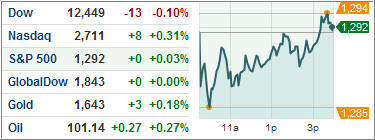It was quite a flat day to say the least as the S&P 500 nudged up a mere 0.03%. Volatility is still quite low, so it will be a guessing game as to when/if the big drop comes especially with Greece’s fate to be decided soon.
While equity ETFs didn’t move all that much, gold hit a 1-month high. Some of the major banks predict gold will hit above $2,000, but that will likely depend on risk perception and how the dollar performs.
But risk perception was ever apparent as the Euro remained depressed at $1.27/Euro while 10-year Treasury yields dropped down to 1.90%. After Germany and the U.K. issued bonds with negative yields, investors will surely be looking for other places to park their money to earn at least a marginally positive return. Something is certainly better than nothing.
According to the Fed’s Beige Book, retail consumption boosted the U.S. economy towards the end of year. However, housing continued to exhibit weakness while full-time hiring was limited despite a drop in unemployment. As Bernanke has previously mentioned, there won’t be sustainable economic growth unless housing and employment improve.
In Europe, Germany’s Federal Statistics Office estimates that its economy contracted in the 4th quarter. Although Germany has record low unemployment, it’s not immune to the contagion.
And economic difficulties may persist after Merkel announced that Germany is planning on contributing more to the European Stability Mechanism, Europe’s permanent bailout fund. When the core Eurozone countries are experiencing weak growth in addition to the already battered peripheral Eurozone countries, the future doesn’t look bright.
If there isn’t enough evidence that Europe is downward debt spiral, this article from the NY Times suggests that Europe will need to sell $1 trillion in bonds this year just to stay afloat. In this ugly pattern of selling new debt to pay off old debt while banks continue to hoard funds instead of lending out, I can’t see a positive outcome emanating out of this situation.
Just as worrying as Europe’s woes are emerging markets. Revised forecasts by a number of agencies already suggest that China, India, Brazil, and others will see a drop off in 2012 growth. With the developed world offering less attractive investment returns in the wake of the crisis, emerging markets may not be able to fill the void in the near future as initially predicted by some.
While we haven’t witnessed a huge slump in markets so far this year, the conditions of Europe, and the rest of the world for that matter, reinforce my decision to play it safe with a conservative bond/sector/equity ETF allocation.
Contact Ulli

Comments 2
Dear Ulli-
I have been following momentum on stocks and ETFs, in part by checking on the % greater than MA200. Some have reached 10% to over 20%. Do you have a rule-of-thumb on this to indicate that the stock is OVERBOUGHT?
Another parameter I have been looking at is HOW LONG the stock has been greater than MA200. Any rule-of-thumb here?
Another parameter is whether the % greater than MA200 is increasing rapidly, in particular, IF THE SLOPE HAS SUDDENLY INCREASED. Any rule-of-thumb here?
Last, I imagine that in each case above, one might need to take into account the OVERALL MARKET CONTEXT, i.e., trading range or strong bull or strong bear, and the sector context. Any rules-of- thumb here?
I am asking such a long string of questions because it seems obvious that a quick yes-or-no will not suffice.
Thanks again, as always-
dg
David,
No rules of thumb for any of your scenarios. I simply let the current momentum carry a fund/ETF to its eventual high point, from which a reversal will occur. If that reversal is strong enough, it will trigger my trailing sell stop and get me out of the market. I attribute the various scenarios you posted simply to the volatility differences of a specific fund/ETF but have not seen a way to use that information in making better investment decisions.
Sorry, I can’t be of more help.
Ulli…